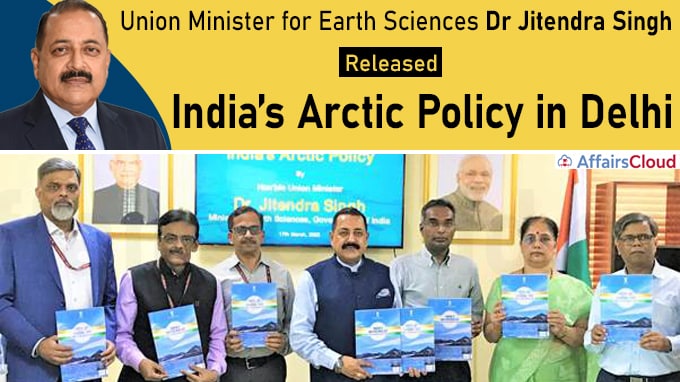 Union Minister of State (MoS) for Earth Sciences, Dr Jitendra Singh released India’s Arctic policy titled ‘India and the Arctic: building a partnership for sustainable development’ in New Delhi. India is one of 13 nations holding Observer status in the Arctic Council.
Union Minister of State (MoS) for Earth Sciences, Dr Jitendra Singh released India’s Arctic policy titled ‘India and the Arctic: building a partnership for sustainable development’ in New Delhi. India is one of 13 nations holding Observer status in the Arctic Council.
- It is available on the website of the Ministry of Earth Sciences (MoES) at https://www.moes.gov.in.
- Thirteen Non-arctic States have been approved as Observers to the Arctic Council.They are France, Germany, Italy, Japan, The Netherlands, China, Poland, India, Republic of Korea, Spain, Switzerland, United Kingdom, Singapore.
Objective:
i.To promote the agenda of strengthening national capabilities and competencies in science and environmental protection, maritime and economic cooperation with the Arctic region.
ii.To enhance understanding of the impact of climate change in the Arctic and deepen India’s participation in climate, economic, and energy security related issues. It studies linkages between polar regions and the Himalayas.
India’s Arctic Policy is based on six pillars:
- Strengthening India’s scientific research and cooperation,
- Climate and environmental protection,
- Economic and human development,
- Transportation and connectivity,
- Governance and international cooperation,
- National capacity building in the Arctic region.
Key points:
i.India began its engagement with the Arctic region when it signed the Svalbard Treaty (originally the Spitsbergen Treaty) in 1920 in Paris, France.
- In 2007, India began its Arctic Research Program which focuses on climate change.
- India also set up a research station ‘Himadri’(2008) in the international Arctic research base at Ny-Alesund, Svalbard, Norway.
ii.India is actively participating in studies and research development related to the Arctic oceanography, atmosphere, pollution and microbiology.
- India established IndArc which is the first multi-sensor moored observatory in Kongsfjorden in 2014 and the northernmost Gruvebadet Atmospheric Laboratory in Ny Alesund in 2016 were launched in the Arctic region.
- The National Centre for Polar and Ocean Research (NCPOR) in Goa under the MoES, is the nodal institution for India’s Polar research programme, which includes Arctic studies.
About Arctic Council:
Founded– 1996
Headquarters- Tromso, Norway
Council members (8)– eight Arctic states; Canada, Denmark, Finland, Iceland, Norway, Sweden, Russia and the U.S
Observer states (13)-France, Germany, Italy, Japan, The Netherlands, China, Poland, India, Republic of Korea, Spain, Switzerland, United Kingdom, Singapore




